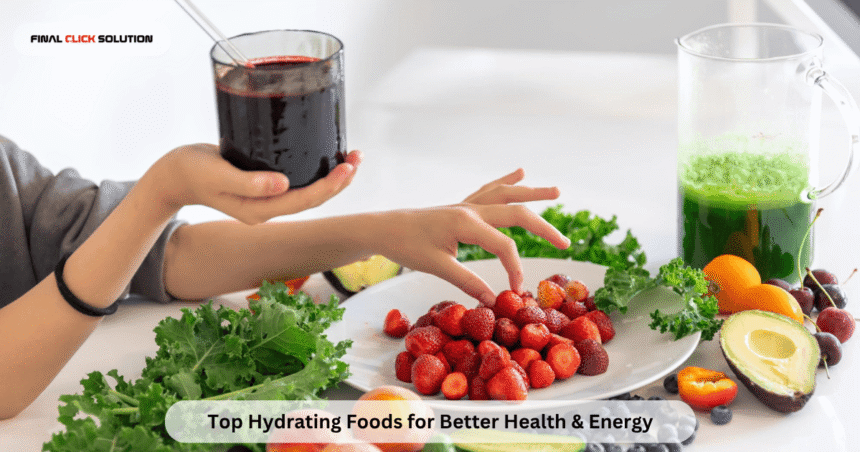Staying hydrated is essential for overall health, but most people think hydration comes only from drinking water. While water is undeniably important, many everyday foods—especially fruits and vegetables—are packed with water, electrolytes, vitamins, and minerals that contribute significantly to hydration. These foods are called hydrating foods, and including them in your daily diet can make staying hydrated easier, more enjoyable, and more nutritious.
This detailed guide explores what hydrating foods are, why they matter, the best options to include in your diet, and how they affect various body functions. With nearly 1800 words of research-based insights, this article will help you make smarter choices for better hydration and overall well-being.
Understanding Hydration Beyond Water
Hydration isn’t just about drinking enough water. True hydration involves balancing:
- Fluids
- Electrolytes
- Minerals
- Vitamins
- Carbohydrates
All these components work together to help your body absorb and use water effectively.
Foods with high water content—usually 70–95% water—help replenish body fluids while delivering nutrients that plain water cannot provide. This makes them especially helpful for people who struggle to drink enough water throughout the day or want to improve hydration through diet quality.
Why Hydrating Foods Matter
Hydrating foods offer benefits far beyond quenching your thirst. Some of the major advantages include:
1. They Improve Overall Hydration
Hydrating foods supplement daily water intake. Because they contain both water and electrolytes, they help the body retain fluids more effectively than water alone.
2. They Support Healthy Skin
Fruits and vegetables with high water content contribute to skin elasticity, moisture balance, and a healthy glow. Hydration also reduces the appearance of dryness and fine lines.
3. They Aid Digestion
Foods rich in water help soften stool, promote smooth digestion, and prevent constipation. They also increase fiber volume in the diet.
4. They Help Regulate Body Temperature
Staying hydrated is key to maintaining body temperature, especially during exercise, warm weather, or illness.
5. They Boost Energy Levels
Dehydration—even mild—can cause fatigue. Hydrating foods replenish fluids and minerals that support energy production.
6. They Support Weight Management
Hydrating foods typically have low calorie density but high nutrient value. They keep you full longer due to their volume and fiber.
7. They Improve Cognitive Function
Proper hydration supports focus, memory, and alertness. Foods rich in water help maintain healthy fluid levels in the brain.
Top Hydrating Foods to Add to Your Diet
Hydrating foods vary widely, but here are some of the most effective and nutrient-dense options.
Water-Rich Fruits
Watermelon (92% Water)
Watermelon is not only delicious but also rich in antioxidants like lycopene and vitamins A and C. Its high water content makes it perfect for hydration, especially during summer.
Strawberries (91% Water)
These berries pack hydration along with fiber, antioxidants, and vitamin C. They are ideal for snacks, smoothies, or salads.
Pineapple (86% Water)
Pineapple hydrates while providing bromelain, an enzyme that aids digestion and reduces inflammation.
Oranges (86% Water)
Oranges deliver hydration, electrolytes, and immune-boosting vitamin C. Their natural sugars also provide a quick energy lift.
Grapefruit (88% Water)
With its tangy flavor, grapefruit is refreshing and hydrating. It also supports metabolism and weight management.
Peaches (89% Water)
Peaches combine hydration with vitamins A, C, and E, making them excellent for skin health.
Cantaloupe (90% Water)
Packed with potassium and beta-carotene, cantaloupe supports heart health and hydration.
Blueberries (84% Water)
A superfood loaded with antioxidants, blueberries hydrate while supporting brain health.
Hydrating Vegetables
Vegetables often contain even more water than fruits, making them excellent hydrating foods.
Cucumber (96% Water)
Cucumbers are one of the most hydrating foods on the planet. They are also low in calories and rich in electrolytes and antioxidants.
Lettuce (95–96% Water)
Iceberg lettuce contains the most water, but romaine and butter lettuce also offer hydration plus nutrients like vitamin A and folate.
Celery (95% Water)
Celery is extremely hydrating and provides electrolytes like sodium, potassium, and magnesium.
Zucchini (94% Water)
Zucchini hydrates while offering vitamin C, potassium, and antioxidants.
Tomatoes (94% Water)
Tomatoes are hydrating and rich in lycopene, which supports heart health.
Bell Peppers (92% Water)
Especially the green ones, bell peppers hydrate and supply vitamin C and fiber.
Spinach (91% Water)
Spinach delivers hydration along with iron, magnesium, and antioxidants.
Hydrating Snacks and Meals
Yogurt
Regular, Greek, or low-fat yogurt contains water, electrolytes, and protein—making it great for hydration and muscle support.
Smoothies
Combining water-rich fruits and vegetables creates an easy, tasty way to boost hydration.
Soups and Broths
These are naturally water-based and provide minerals and vegetables that replenish fluids.
Chia Pudding
When chia seeds absorb water, they form a hydrating gel that also delivers fiber and omega-3 fats.
Coconut Water
While technically a drink, coconut water is worth mentioning for its natural electrolytes like potassium and sodium.
Hydrating Foods for Different Lifestyles
For Active Individuals
Athletes and physically active people lose more fluids through sweat. Hydrating foods that help replenish electrolytes include:
- Coconut water
- Oranges
- Watermelon
- Bananas
- Tomatoes
- Celery
Combining hydrating foods with good fluid intake improves stamina and recovery.
For Kids
Children often forget to drink water. Offering them hydrating foods can naturally help:
- Berries
- Watermelon cubes
- Cucumber slices
- Yogurt
- Smoothies
These make hydration fun and nutritious.
For Older Adults
Seniors are at higher risk of dehydration due to decreased thirst sensation. Hydrating foods help compensate:
- Soup
- Applesauce
- Melons
- Soft fruits
- Leafy greens
These are gentle on digestion and easy to consume.
For People on Weight-Loss Plans
Hydrating foods are naturally low in calories but high in volume:
- Lettuce
- Zucchini
- Strawberries
- Grapefruit
They increase fullness without adding many calories.
Hydrating Foods for Skin and Beauty
Proper hydration enhances skin elasticity, glow, and softness. Foods especially good for skin hydration include:
- Cucumber
- Oranges
- Tomatoes
- Berries
- Leafy greens
These foods contain antioxidants and water that nourish skin from the inside.
The Science Behind Hydrating Foods
Hydrating foods contain structured water—water held within plant fibers and cells. This water is absorbed slowly, helping maintain fluid levels for a longer time than drinking water alone.
They also provide electrolytes (potassium, magnesium, sodium) that ensure water stays inside cells rather than being rapidly flushed out.
Fiber in hydrating foods also plays a role by retaining water during digestion, improving hydration and gut health simultaneously.
How to Build a Diet Rich in Hydrating Foods
Here are practical tips for adding more hydrating foods into your meals.
Start Your Day with Water-Rich Fruits
- Watermelon
- Oranges
- Grapefruit
- Berries
These boost hydration early in the day.
Add Hydrating Veggies to Every Meal
- Cucumbers
- Tomatoes
- Lettuce
- Bell peppers
Use them in salads, wraps, or sandwiches.
Replace Snacks with Hydrating Options
Instead of chips or processed snacks, choose:
- Pineapple
- Celery sticks
- Yogurt
- Smoothies
Eat More Soups and Broths
Light vegetable soups provide fluid, minerals, and hydration.
Drink Infused Water
Add slices of hydrating foods like:
- Cucumber
- Lemon
- Mint
- Strawberries
This makes water tastier and more refreshing.
Signs You Need More Hydrating Foods
Even if you drink water, you may still be mildly dehydrated. Watch for:
- Dry skin
- Fatigue
- Headaches
- Dark urine
- Constipation
- Cramping
- Dizziness
Including hydrating foods each day helps prevent these symptoms, especially in hot weather or during exercise.
Sample One-Day Hydrating Meal Plan
Breakfast:
Greek yogurt with strawberries and blueberries
Snack:
Cucumber slices with a small dip
Lunch:
Mixed salad with lettuce, tomatoes, bell peppers, and grilled chicken
Snack:
Watermelon bowl
Dinner:
Vegetable soup with zucchini, celery, and spinach
Before bed:
Herbal tea with lemon
This meal plan supplies well over a liter of water through food alone.
Conclusion
Hydrating foods are an essential but often overlooked part of maintaining proper hydration. They provide water, electrolytes, vitamins, fiber, and antioxidants that contribute to better digestion, glowing skin, sustained energy, improved brain function, and overall well-being.
While drinking water is vital, consuming a diet rich in water-dense fruits, vegetables, yogurts, and soups ensures your body stays hydrated from multiple angles. Whether you are active, managing your weight, caring for children or seniors, or simply aiming for optimal health, hydrating foods make hydration easier, tastier, and more nutritious.
Incorporating a variety of these foods into your daily routine can transform your hydration levels and support a healthier lifestyle—all through simple, natural, everyday choices.








